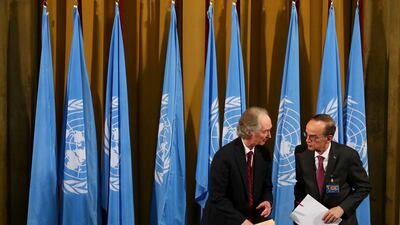Talks on a new constitution for Syria ended Saturday in Geneva without concrete progress, but the UN mediator said those who attended found commonalities and were keen to meet again.
UN special envoy for Syria, Geir Pedersen, said he hoped the talks between representatives of Syrian President Bashar Al Assad's government, the opposition and civil society could eventually pave the way for a broader political process in the country.
But the latest round of discussions ended without even an agreement on an agenda or date for the next session.
Mr Pedersen said there were still strong disagreements between the sides after nearly a decade of conflict in Syria.
But he said he was "extremely pleased to hear the two co-chairs [of the government and opposition delegations] saying very clearly that they thought also there were quite a few areas of commonalities".
The chief opposition negotiator, Hadi Al Bahra, was also optimistic.
He said that while "there were certain points of disagreements ... I believe the commonalities were larger than the differences".
A source with the Syrian government delegation, meanwhile, told Syrian state news agency Sana that the delegations were "keen on continuing to work openly in upcoming rounds".
Mr Pedersen said he received a clear message from all sides that they were eager to meet again, which he said was encouraging.
The meeting marked the first UN attempt to resume in-person diplomatic negotiations in Geneva since the coronavirus pandemic forced the city to close down in March.
Mr Pedersen acknowledged that the discussions got off to a difficult start.
Only hours after the talks began on August 24, they were put on hold after four delegates tested positive for Covid-19.
The committee members – 15 each from the government, the opposition and from civil society – were tested for the disease before they travelled to Geneva and were tested again on arrival.
Some delegates tested positive in Geneva.
Mr Pedersen's office decided to resume the talks last Thursday afternoon after Swiss health authorities said it would safe to do so.
He said he believed the incident showed it was possible to move ahead with talks in a responsible manner.
"It is possible to handle even complicated cases as long as you follow strictly medical protocol and the advice you are receiving," he said.
"That is why we also hope that it will be possible to have the next round here in Geneva."
The Constitutional Committee was created in September last year and first convened a month later, but the pandemic and disagreements over the agenda hindered further meetings until this week.
The UN has been striving for more than nine years to nurture a political resolution to Syria's civil war, which has killed more than 380,000 people and displaced more than 11 million.
UAE currency: the story behind the money in your pockets
How to avoid crypto fraud
- Use unique usernames and passwords while enabling multi-factor authentication.
- Use an offline private key, a physical device that requires manual activation, whenever you access your wallet.
- Avoid suspicious social media ads promoting fraudulent schemes.
- Only invest in crypto projects that you fully understand.
- Critically assess whether a project’s promises or returns seem too good to be true.
- Only use reputable platforms that have a track record of strong regulatory compliance.
- Store funds in hardware wallets as opposed to online exchanges.
The biog
Fatima Al Darmaki is an Emirati widow with three children
She has received 46 certificates of appreciation and excellence throughout her career
She won the 'ideal mother' category at the Minister of Interior Awards for Excellence
Her favourite food is Harees, a slow-cooked porridge-like dish made from boiled wheat berries mixed with chicken
COMPANY PROFILE
Name: HyperSpace
Started: 2020
Founders: Alexander Heller, Rama Allen and Desi Gonzalez
Based: Dubai, UAE
Sector: Entertainment
Number of staff: 210
Investment raised: $75 million from investors including Galaxy Interactive, Riyadh Season, Sega Ventures and Apis Venture Partners
COMPANY%20PROFILE
%3Cp%3E%3Cstrong%3EName%3A%20%3C%2Fstrong%3EEjari%3Cbr%3E%3Cstrong%3EBased%3A%20%3C%2Fstrong%3ERiyadh%2C%20Saudi%20Arabia%3Cbr%3E%3Cstrong%3EFounders%3A%20%3C%2Fstrong%3EYazeed%20Al%20Shamsi%2C%20Fahad%20Albedah%2C%20Mohammed%20Alkhelewy%20and%20Khalid%20Almunif%3Cbr%3E%3Cstrong%3ESector%3A%20%3C%2Fstrong%3EPropTech%3Cbr%3E%3Cstrong%3ETotal%20funding%3A%20%3C%2Fstrong%3E%241%20million%3Cbr%3E%3Cstrong%3EInvestors%3A%20%3C%2Fstrong%3ESanabil%20500%20Mena%2C%20Hambro%20Perks'%20Oryx%20Fund%20and%20angel%20investors%3Cbr%3E%3Cstrong%3ENumber%20of%20employees%3A%20%3C%2Fstrong%3E8%3C%2Fp%3E%0A
Key findings of Jenkins report
- Founder of the Muslim Brotherhood, Hassan al Banna, "accepted the political utility of violence"
- Views of key Muslim Brotherhood ideologue, Sayyid Qutb, have “consistently been understood” as permitting “the use of extreme violence in the pursuit of the perfect Islamic society” and “never been institutionally disowned” by the movement.
- Muslim Brotherhood at all levels has repeatedly defended Hamas attacks against Israel, including the use of suicide bombers and the killing of civilians.
- Laying out the report in the House of Commons, David Cameron told MPs: "The main findings of the review support the conclusion that membership of, association with, or influence by the Muslim Brotherhood should be considered as a possible indicator of extremism."
MATCH INFO
Uefa Champions League quarter-final second leg:
Juventus 1 Ajax 2
Ajax advance 3-2 on aggregate
Hydrogen: Market potential
Hydrogen has an estimated $11 trillion market potential, according to Bank of America Securities and is expected to generate $2.5tn in direct revenues and $11tn of indirect infrastructure by 2050 as its production increases six-fold.
"We believe we are reaching the point of harnessing the element that comprises 90 per cent of the universe, effectively and economically,” the bank said in a recent report.
Falling costs of renewable energy and electrolysers used in green hydrogen production is one of the main catalysts for the increasingly bullish sentiment over the element.
The cost of electrolysers used in green hydrogen production has halved over the last five years and will fall to 60 to 90 per cent by the end of the decade, acceding to Haim Israel, equity strategist at Merrill Lynch. A global focus on decarbonisation and sustainability is also a big driver in its development.
The five pillars of Islam
1. Fasting
2. Prayer
3. Hajj
4. Shahada
5. Zakat
More from Rashmee Roshan Lall

